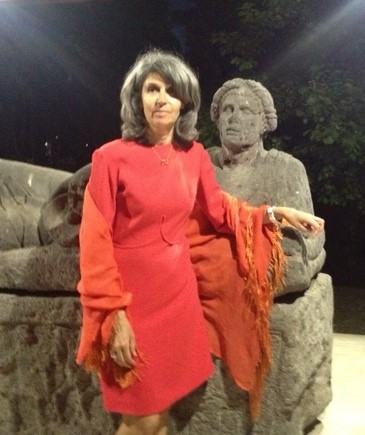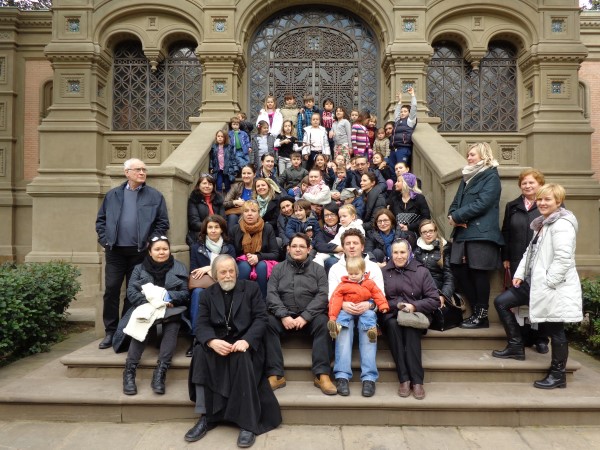As strange as it might be, the Russian Florence exists not only in the past, thanks to the people, who are trying their best to help their compatriots save the reminiscence of Russia in Italy. Valeria Sergeyeva, president of Russian Compatriots Association in Florence tells about Russians and the Russian culture.
‒ Valeria, how did you come to Italy?
‒ It’s a common story – I met an Italian guy and we got married. In early 1990s, my husband was an amateur in a charity humanitarian aid project of the K.A. Rauchfuss Hospital (Saint Petersburg) and I was the Russian organizer. We visited each other for a few years, I continued different Russian-Italian projects as a manager and then the Russian crisis burst out in 90s. My husband is a designer, he got a very good job offer in Florence and I moved to Italy.
Students of Florence parochial school and their parents
Florence, just as St. Petersburg, is a cultural city, but it is far smaller, than my hometown and lives in a slower rhythm. As everyone else, I had to go through a difficult adaptation period and find my place.
Florentines are a very special “nation” – you need years to have their favour. There were few of Russians when I moved here and as it is in most other countries, the Russian diaspora concentrated around the Orthodox church. Its intellectual centre is father Georgiy and mother Nina and also Anna Vorontsova – Pushkin’s descendant, which at that moment was a
churchwarden.
‒ One of the most serious emigration challenges is that a person ends up outside of a familiar cultural and social environment.
‒ Sure, not least because at first it is difficult to put your ideas into words of a different language at the desired level. I cannot complain – gradually, thanks to joint Russian-Italian projects, a circle of contacts has formed around me.
In 2005, we opened a
“Fontanka” company to hold massive cultural events. For instance, we had a project “Russians in Florence”, which ran for 5 five years and was dedicated to the Demidov’s dynasty.
Famous “Villa Demidoff” gathered historians, fine art experts and philologists from different areas of Italy. This villa, alongside with other architecture monuments in Florence, is an example of the Russian cultural heritage in Italy. The Demidovs financed Italian schools, hospitals, orphanages and were committed to arts.
Then, in 2009, we opened a
Centre of Russian Language and Culture in Florence. A year ago, our association changed its status from “cultural” to “social”. Without going into details I would only say, that this status gives us a full opportunity to teach the Russian language.
− Florence is no Rome or Milan, the Russian community is not so big here… Was your school the first one?
‒ Yes, there was nothing of the kind before in Tuscany. There is only a
Cultural Community Italy-Russia, where there are paid courses of Russian for foreigners, it is fashionable now. To get our own premises, we had to come through almost all the circles of hell, straight out of Dante’s works. It is very difficult to find a place, which would correspond to all the standards of working with children. Later, we managed to rent premises at one of the local schools, with the consent of the city administration. Can you imagine, when we started, we had 20 children in a single room! The children were divided according to their age
and the teachers worked for free.
− How did you understand that there is a need to open a Russian school in Florence?
− A teacher at the Florence University Irina Dvizova contacted me. A few of her Russian students wanted to keep up their children’s skills in the Russian language. University graduates have the philological base but did not know how to organize the teaching process. One of Dvizova’s students Anna Aleksandrova became the Centre’s coordinator and co-founder. I can say, that thanks in a large part to her, the Centre is running and getting more and more popular.
The Russian diaspora has changed during recent years. There are wealthy people, who come to live here temporarily, and those, who come to work on contractual basis. Many mothers of our children work as guides and their Italian fathers are terribly proud their children speak Russian. By the way, we have Russian courses for the Italian dads in our school.
One more “group” is girls that got married to Italians early and came to Italy, not having formed their cultural identity. They absorb basic family values, but the cultural basics are often left behind – there is no time for museums, when you have babies. Nonetheless, many parents come to us from other cities – this is their great achievement!
‒ Why is it so important to teach Russian to the children, who hear Russian at home?
‒ This is it, they do not hear it so often! Most Russian women, apart from their Italian husbands, also live in a strictly Italian environment. This is why it is so hard to convince the child of importance of Russian, to encourage the child learn it, read Russian books… Our main purpose was to teach Russian as it is taught at home – something, many our students were deprived of at home. In addition, not all the children born in Italy visit Russia. We try to provide them with the cultural background they are missing, growing up in Italy. Apart from basic Russian grammar, it is also Russian cultural traditions, habits and, what is most important – face-to-face interaction. This is why an arts centre is the best possible opportunity for socialization.
Lessons at the Centre of Russian Language and Culture
‒ How did the school develop?
‒ A rumor spread about us. Then, we found premises with five rooms through our friends and the number of children grew. But we still had a problem – we had few teachers. It’s an interesting contradiction – there are now much more Russians in the city, but only few of them are professional philologists or teachers. Furthermore, we are quite a semi volunteer organization and have little money.
After that, we had a literature problem – it was impossible to download on the internet at first. Now the choice is big, but not much of it match our purposes. We visit seminars, conferences, buy Russian textbooks, but do often come across the fact that they do not suite our children. For example, how do we explain the Italian children what is autumn sludge or winter snowfalls, when they have only seen it a couple of times in the mountains?
We have 90 children now, 10 permanently working groups. In general, children come on Saturdays. Russian often takes the last place of importance among additional lessons after football, dance classes, gymnastics, music, as we are an art centre of additional education.
Now, we do not have a purpose to make a school with strict standards – there is no demand for it. But there is demand for a socially comfortable environment with educational elements. For instance, we have introduced an arts and crafts class. We do not just draw or model, but also make Russian arts and crafts familiar to children. We have recently started a course, where we tell how Khokhloma and Gzelian ceramics emerged. We are glad to know, that sometimes children like it more here, than at Italian school and they come to our lessons with pleasure.
‒ We often mention “the Russian signs” in Florence…
‒ Yes, they are very significant. By the way, at the old Lutheran Allori cemetery, there are many representatives of the Russian nobility buried. As the cemetery is private, the places have to be permanently paid. But many descendants are not to be found and there comes a moment, when all the unpaid remains will be reburied in a collective grave. At the present moment, an expert in the Demidovs, a Russianist Lucia Tonini is finishing a book about the history of Russian cemeteries. The situation with the Russian cemeteries in Italy is more or less equal across Italy and we are trying to catch attention of the Russian government to the fate of these graves.

We have already mentioned the Demidovs, who have left a villa with a park and presented an icon stand to the Orthodox church. There was a ballet school some day and the ballerinas of Mariinskiy Theatre taught here. Also Dostoyevsky left his "signs" in Florence - he wrote his "Idiot" here. A memorial plate on the house, where the novel was written, is near Palazzo Pitti. Tarkovskiy's son lives in Florence, the city administration gave him the apartment, where his famous father lived. And also Tchaikovsky, who loved our city. He wrote a lot here and the most outstanding of his works is the "Queen of Spades" opera.
In 2011, we were involved in "Russians in Florence. A Day with Tchaikovsky" project. In the framework of the project, we held concerts, readings of Pushkin's "Queen of Spades" in the famous Oblate library and literary lectures. Based on the composer's letters, we designed and held a guided tour, where Pyotr Ilyich walked himself.
‒ Was the famous "Souvenir de Florence" composed after visiting Italy?
‒ Sure. He composed "Maid of Orleans" and "Queen of Spades" right in Florence. Nadezhda von Meck rented a villa for Tchaikovsky in the Florentine hills, 300 meters from her own Kora villa. The "Maid of Orleans" was written there. When the relationships with von Meck ended, he continued visiting Florence and rented apartments on Arno riverbank. The "Queen of Spades" was written there in 40 days.
He described his free time in Italy in the letters to friends in details. Apart from our expectations about luxurious lives of musicians, the composer had a strict timetable. He worked on a by-order basis, had deadlines. The house, which used to be a small hotel, where Tchaikovsky lived, has no sign on it. Everyone needs this memory - Russians, Italians, who set a high value on our culture, and our children. Of course, they will be proud to be connected with the great Russian culture, I hope. And this memorial sign may become one more step to this, one more "sign" in the Russian history.










